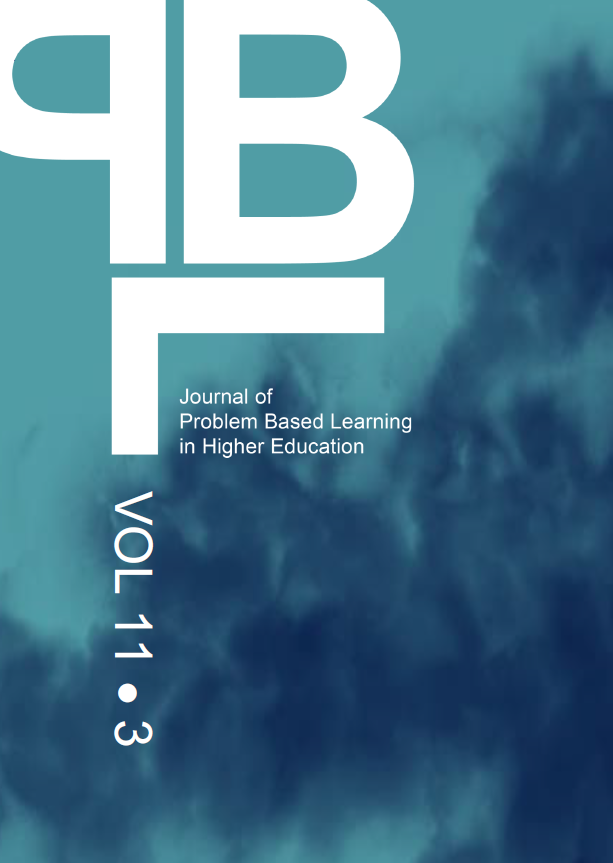Abstract
This case study piloted an interdisciplinary Problem-Based Learning course, utilizing Hung’s (2006) 3C3R model. We explain the course design, curriculum, and implementation. We collected qualitative written questionnaires from students who participated in the course to investigate their learning experiences. As a result, students shed light on lessons they learned throughout the course, which led to the creation of a lessons learned guide for future instructors. This guide encompasses 8 lessons that were gleaned by both qualitative student feedback and instructor reflections from the course. These lessons include allocating in-class time to work on projects, using a modular approach in the course design, presenting students with real-life problems related to the topic of the course, providing in-class case studies for students to get acquainted with examples of previous work, grouping students from diverse academic backgrounds together when possible, utilizing online and librarian resources, surveying the classroom on their comfort with self-directed learning beforehand, and including a self-reflection piece at the end of the course.
References
AI-Saleem, N. E. (2018). Historical Development of the Interdisciplinary Studies [Chapter]. Promoting Interdisciplinarity in Knowledge Generation and Problem Solving; IGI Global. https://doi.org/10.4018/978-1-5225-3878-3.ch014
Barrows, H. S. (1986). A taxonomy of problem-based learning methods. Medical Education, 20(6), 481-486. https://doi.org/10.1111/j.1365-2923.1986.tb01386.x
Boon, M., & Van Baalen, S. (2018). Epistemology for interdisciplinary research – shifting philosophical paradigms of science. European Journal for Philosophy of Science, 9(1), 16. https://doi.org/10.1007/s13194-018-0242-4
Braßler, M. (2016). Interdisciplinary Problem-Based Learning—A Student-Centered Pedagogy to Teach Social Sustainable Development in Higher Education. In W. Leal Filho & P. Pace (Eds.), Teaching Education for Sustainable Development at University Level (pp. 245–257). Springer International Publishing. https://doi.org/10.1007/978-3-319-32928-4_17
Ezezika, O., & Johnston, N. (2023). Development and Implementation of a Reflective Writing Assignment for Undergraduate Students in a Large Public Health Biology Course. Pedagogy in Health Promotion, 9(2), 101–115. https://doi.org/10.1177/23733799211069993
Garrett, M. D. (2019). Interdisciplinary Learning Communities: Bridging the Gap between the Sciences and the Humanities through Forensic Science. In Teaching Chemistry with Forensic Science (Vol. 1324, pp. 109–136). American Chemical Society. https://doi.org/10.1021/bk-2019-1324.ch007
Godden, D. R., & Baddeley, A. D. (1975). Context-dependent memory in two natural environments: On land and underwater. British Journal of Psychology, 66(3), 325–331. https://doi.org/10.1111/j.2044-8295.1975.tb01468.x
Halpern, D. F., & Hakel, M. D. (2003). Applying the Science of Learning to the University and Beyond: Teaching for Long-Term Retention and Transfer. Change, 35(4), 36-41. http://dx.doi.org/10.1080/00091380309604109
Hmelo, C. E., & Ferrari, M. (1997). The Problem-Based Learning Tutorial: Cultivating Higher Order Thinking Skills. Journal for the Education of the Gifted, 20(4), 401–422. https://doi.org/10.1177/016235329702000405
Hmelo-Silver, C. E. (2004). Problem-Based Learning: What and How Do Students Learn? Educational Psychology Review, 16(3), 235–266. https://doi.org/10.1023/B:EDPR.0000034022.16470.f3
Hung, W. (2006). The 3C3R Model: A Conceptual Framework for Designing Problems in PBL. Interdisciplinary Journal of Problem-Based Learning, 1(1). https://doi.org/10.7771/1541-5015.1006
Imafuku, R., Kataoka, R., Mayahara, M., Suzuki, H., & Saiki, T. (2014). Students’ Experiences in Interdisciplinary Problem-based Learning: A Discourse Analysis of Group Interaction. Interdisciplinary Journal of Problem-Based Learning, 8(2). https://doi.org/10.7771/1541-5015.1388
Ivanitskaya, L., Clark, D., Montgomery, G., & Primeau, R. (2002). Interdisciplinary Learning: Process and Outcomes. Innovative Higher Education, 27(2), 95–111. https://doi.org/10.1023/A:1021105309984
Kaplan, S., Milde, J., & Cowan, R. S. (2016). Symbiont Practices in Boundary Spanning: Bridging the Cognitive and Political Divides in Interdisciplinary Research. Academy of Management Journal, 60(4), 1387–1414. https://doi.org/10.5465/amj.2015.0809
Khiat, H. (2015). Measuring Self-Directed Learning: A Diagnostic Tool for Adult Learners. Journal of University Teaching & Learning Practice, 12(2). https://doi.org/10.53761/1.12.2.2
Kim, D. H., Jung, J. S., Jung, D. S., Kim, D. H., Jung, J. S., & Jung, D. S. (n.d.). Principles for Creation of PBL problems. Korean Journal of Medical Education, 11(1), 17–23. https://doi.org/1999.11.1.17
Maudsley, G. (1999). Do we all mean the same thing by “problem-based learning”? A review of the concepts and a formulation of the ground rules. Academic Medicine: Journal of the Association of American Medical Colleges, 74(2), 178–185. https://doi.org/10.1097/00001888-199902000-00016
Rinehart, S. D., Stahl, S. A., & Erickson, L. G. (1986). Some effects of summarization training on reading and studying. Reading Research Quarterly, 21(4), 422–438. https://doi.org/10.2307/747614
Savery, J. R., & Duffy, T. M. (1995). Problem Based Learning: An Instructional Model and Its Constructivist Framework. Educational Technology, 35(5), 31–38.
Savin-Baden, M., & Major, C. H. (2004). Foundations of problem-based learning. McGraw-hill education (UK).
Stentoft, D. (2017). From saying to doing interdisciplinary learning: Is problem-based learning the answer? Active Learning in Higher Education, 18(1), 51–61. https://doi.org/10.1177/1469787417693510
Tawfik, A. A., Trueman, R. J., & Lorz, M. M. (2013). Designing a PBL Environment Using the 3C3R Method. International Journal of Designs for Learning, 4(1). https://www.academia.edu/7398319/Designing_a_PBL_Environment_using_the_3C3R_Method
Thomas, D. R. (2006). A General Inductive Approach for Analyzing Qualitative Evaluation Data. American Journal of Evaluation, 27(2), 237–246. https://doi.org/10.1177/1098214005283748

This work is licensed under a Creative Commons Attribution 4.0 International License.
Copyright (c) 2022 Mona Jarrah , Bethelehem Girmay, Obidimma Ezezika
